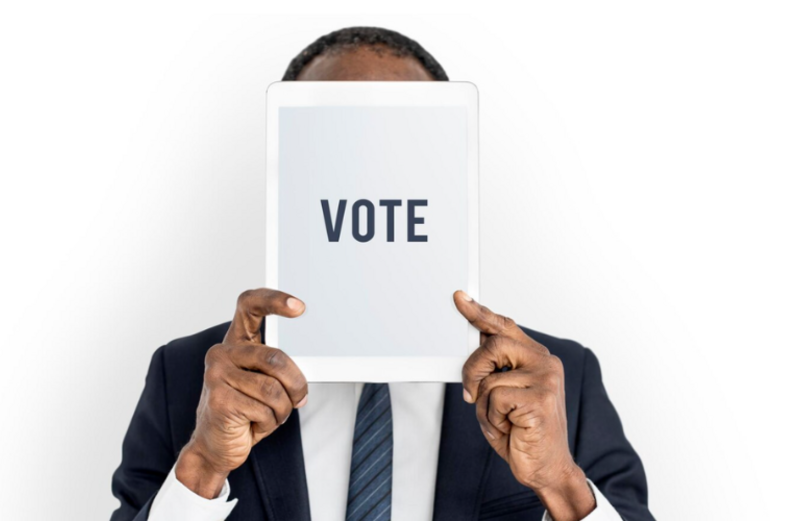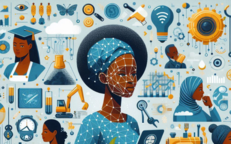Harnessing Artificial Intelligence (AI) for Transparent Elections: A New Dawn for African Democracy

This blog is a collaborative effort between the APET-CJED secretariat and Dr Scott Timcke, Senior Research Associate, Research ICT Africa. It is the 10th post in a blog series to be published in 2024 by the APET Secretariat on behalf of the AU High-Level Panel on Emerging Technologies (APET)
Democracy is a cornerstone of governance that empowers citizens to participate in decision-making processes, hold leaders accountable, and protect fundamental rights. Key principles include freedom of expression, consciousness, assembly, and free and fair elections, and in so doing, allowing universal suffrage. Across the diverse landscape of Africa, the journey towards democratic governance has witnessed significant strides and challenges. Elections in Africa are fundamental to democracy, empowering people to choose their leaders and influence government policies and democracy, in essence, is a system of government where power is held by the people, either directly or indirectly through elected representatives.
In recent decades, Africa has witnessed a gradual but steady transition towards democratic governance, marked by adopting multiparty systems, the peaceful transfer of power, and the expansion of political freedoms. Many African countries have conducted regular elections, allowing citizens to choose their representatives through a democratic process. The emergence of vibrant civil societies, independent media, and active citizen engagement has further advanced the cause of democracy, and the call to utilise emerging technologies in fostering a culture of accountability and transparency in governance, one of which is Artificial Intelligence (AI).
AI has emerged as a groundbreaking technology that holds the potential to revolutionise various sectors, including politics and governance. In the context of African democracies, where electoral integrity and transparency are essential for upholding democratic principles, the integration of AI-driven solutions in election processes offers a promising avenue for ensuring fair, reliable, and accountable elections. However, challenges such as voter manipulation, fraud, and irregularities have plagued many electoral processes, leading to contested results and political unrest.
AI has the potential to offer an opportunity to address these issues and transform the electoral landscape, thereby ensuring that elections are free, fair, and accountable. African Union (AU) Member States have made significant strides in recent decades despite ongoing challenges, improving their electoral processes, and upholding democratic principles.[1] A notable development is the increasing participation of Africans participating in elections, demonstrating increased public engagement in political affairs. The 2020 presidential election in Ghana, for example, saw a remarkable voter turnout, with over 79% of eligible voters casting their ballots, an increase attributable to better digitalisation of the electoral system.[2]
This blog explores the transformative impact of AI on election management in Africa and its role in fostering a new era of democratic governance on the continent. The blog proposes the adoption of AI-powered solutions to revolutionise election management in African countries, improving voter registration, monitoring, and results verification. By leveraging AI tools, African nations can usher in a new era of fair and transparent elections that strengthen democratic principles and promote confidence in electoral outcomes.
In recent years, the rapid advancement of Artificial Intelligence (AI) has opened up new possibilities for enhancing transparency, accountability, and integrity in election processes. Africa’s evolving democracies are experiencing a significant increase in voter participation, reflecting significant progress in critical domains, such as governance. This includes the establishment of independent electoral commissions to ensure fairness and transparency, intensified voter registration initiatives to enhance citizen engagement, and adoption of reliable vote counting and verification methods to combat electoral malpractice. Furthermore, there is a commendable commitment by African governments to upholding democratic principles, encompassing respect for the rule of law, protection of human rights, and leadership accountability, fostering a culture of democratic governance. Increased voter participation signals deeper member state ownership, collaborative planning, and citizen engagement, emphasising a collective commitment to Africa’s transformation.[3]
The AU has been a champion of democratic governance. The heightened engagement with AU voting frameworks, such as the African Charter on Democracy, Elections, and Governance (ACDEG) and African Union Election Observation Missions (AUEOMs), reflects a growing embrace of democratic norms, peer review, and accountability mechanisms, strengthening democratic institutions across the continent.[4] Technological advancements, including biometric voter registration[5] and computerised voting mechanisms, serve as crucial safeguards against electoral fraud, thereby enhancing transparency and efficiency in the electoral process.[6] Leveraging biometric data ensures more accurate voter rolls, while computerised voting systems streamline ballot casting, fostering greater trust and confidence in the electoral process among citizens.[7]
According to the African Union High-Level Panel on Emerging Technologies (APET), AI holds both promise and risks for democracy and human rights in Africa. The panel asserts that on one hand, AI has the potential to enhance democracy and human rights by promoting transparency and accountability. In citing some examples, the panel mentions platforms like “Ushahidi” in Kenya[8] and “Afriwitness” in South Africa which use AI to monitor elections and document human rights abuses.[9] Additionally, AI facilitates citizen participation, as seen with initiatives like “M-Pesa” in Kenya[10] and the “I Vote” app in Ghana[11], which empowers citizens through financial inclusion and provides election information to reduce disenfranchisement. Another example is a platform like “Zindi” in Zimbabwe, where AI is being used to strengthen governance by enabling governments to analyse data for better policy formulation. [12] Lastly is Rwanda’s exploration of AI-powered chatbots to improve access to government services.
Despite the benefits of AI, the technology also poses risks to democracy and human rights, including surveillance and suppression through inaccurate facial recognition technology, algorithmic bias perpetuating discrimination during elections. To navigate this double-edged sword, the development and responsible utilisation of AI for democracy must ensure consideration of ethics, human rights, and democratic values. As a result, it is imperative for governments to invest in digital literacy programmes and open discussions among policymakers, researchers, and civil society, as these are critical to harnessing AI to empower citizens during elections and strengthen African democratic governance.
The modern understanding of democracy evolved during industrialisation, with further development in public administration and the welfare state following the Great Depression. Decolonisation movements in African countries sought liberation, enfranchisement, representation, and self-rule, led by active participation from Africa’s various stakeholders. While some countries embraced democracy, others focused on economic self-determination or alternative frameworks for liberation. Despite varied responses, generations of Africans have strived for democratic representation, establishing institutions, advocating for equality before the law, and promoting free and fair elections. With this history in mind, African countries have the potential of utilising AI to promote democratic governance and sustain these hard-won political gains.
Africa holds immense potential for utilising AI in all development sub-sectors, including free and fair elections and democratic governance. By embracing a context-specific approach to AI and moving away from one-size-fits-all models, inclusive, African countries can build resilient democracies. APET recognises that Africa stands at a pivotal moment to address pressing challenges through a reimagined approach to AI governance and adoption of applicable policy frameworks. To leverage AI responsibly, Africa is encouraged to rethink AI governance by shifting away from western-dominated models and embracing African-centred frameworks that prioritise human rights, transparency, and democratic participation among others.
APET asserts that transparent elections are vital for the credibility and legitimacy of democratic governance in Africa. The panel further asserts that harnessing AI offers an opportunity to transform the electoral landscape, thereby ensuring that elections are free, fair, and accountable. The panel asserts that strengthening African democracies with AI involves promoting transparency, accountability, citizen engagement, and governance, using AI tools for election monitoring, voter education, information dissemination, and policy decision-making. The panel urges Africa to harness AI for democratic governance, which presents countries with an unprecedented opportunity to modernise electoral systems, and restore public trust in the electoral process. By embracing AI solutions, African countries can pave the way for fair and credible elections, thereby fostering a new era of democratic governance and political stability on the continent.
The AU is positioned as a pivotal facilitator in supporting and advocating for Member States as they navigate towards securing and fostering democratic governance of AI on the continent. Recognising the global implications of AI systems, the AU is facilitating multilateral cooperation in developing ethical AI governance frameworks that uphold democratic principles and human rights.[13] Leveraging existing organisations and critical working groups, the AU is spearheading the formulation of guidelines for accountable AI that aligns with democratic values, principles, and human rights.[14] By crafting innovative policy solutions tailored to Africa’s socio-economic landscape and ensuring democracy, the countries can harness the opportunities presented by AI while mitigating associated risks. In doing so, AU Member States can collectively safeguard the democratic rights of their citizens to free and fair elections.[15]
The panel acknowledges voter registration as a critical stage in an election cycle, which forms the foundation of a credible electoral process. APET urges countries to harness AI algorithms for voter registration, to enhance the accuracy and efficiency of voter rolls, as AI tools enable the deduplication of voter data, verify voter information in real-time, and minimise the risk of fraudulent registrations. According to the panel, this automated process not only streamlines voter registration but also reduces the likelihood of discrepancies and manipulation, thereby increasing the integrity of the electoral database. Panel members also argue that during elections, African countries should utilise monitoring and surveillance as this plays a pivotal role in safeguarding the transparency and fairness of the voting process.
APET enumerates some benefits of AI-powered surveillance systems which include monitoring polling stations, detecting irregularities, and ensuring compliance with electoral rules. Further, through real-time data analysis and anomaly detection, AI technologies enable election officials to identify suspicious activities, unauthorised access, or potential fraud incidents. APET further posits that by enhancing monitoring capabilities with AI, African countries can bolster the accountability of electoral processes and mitigate the risks of electoral malpractices. Below are some policy recommendations outlined by APET for AU Member States and relevant stakeholders:
- Implement AI algorithms for accurate voter registration, deduplication, and verification, reducing the risk of multiple registrations and ghost voters. This will enhance the integrity of voter rolls and minimise election-related fraud.
- Use AI-powered surveillance systems to monitor polling stations, detect anomalies, and ensure compliance with electoral laws. Real-time data analysis can identify irregularities and improve transparency during voting and counting processes.
- Integrate blockchain technology with AI to create a secure and tamper-proof voting system. This decentralised approach enhances the integrity of election results, prevents tampering, and increases public trust in the electoral process.
- Employ AI algorithms to cross-verify election results from different polling stations, ensuring consistency and accuracy. This automated verification process reduces human error and enhances the credibility of election outcomes.
- Invest in training programs for election officials, IT professionals, and stakeholders to build expertise in AI technologies for electoral management. Facilitate multi-stakeholder dialogues to ensure inclusive and transparent decision-making processes.
Featured Bloggers:
Barbara Glover – AUDA-NEPAD
Justina Dugbazah – The Sahara Institute
Bhekani Mbuli – University of Johannesburg
Chifundo Kungade – AUDA-NEPAD
Nhlawulo Shikwambane – AUDA-NEPAD
Maria Stella Namyalo – AUDA-NEPAD
Scott Timcke, Research ICT Africa
[1] https://www.socialistinternational.org/committees/africa/dakar-was-the-venue-of-the-si-africa-committee/introduction-democracy-and-electoral-processes-in-africa/
[2] https://ec.gov.gh/2020-presidential-election-results/
[3] https://www.idea.int/sites/default/files/publications/emerging-trends-and-challenges-of-electoral-democracy-in-africa.pdf
[4] https://au.int/en/pressreleases/20240523/african-union-election-observation-mission-arrives-south-africa-ahead-2024
[5] https://www.iebc.or.ke/election/technology/?Biometric_Voter_Registration_System_(BVR)
[6] http://repository.tukenya.ac.ke/bitstream/handle/123456789/1777/ICT%20in%20electoral%20processes.pdf?isAllowed=y&sequence=1
[7] https://au.int/en/treaties/african-charter-democracy-elections-and-governance
[8] https://www.ushahidi.com/about/blog/empowering-communities-through-technology-ushahidi-s-vision-for-ai-and-social-impact/
[9] https://researchictafrica.net/wp/wp-content/uploads/2024/02/RIA_Decoding-the-Ballot_How-Might-AI-Reshape-Democracy-on-the-African-Continent-1.pdf
[10] https://www.the-star.co.ke/news/big-read/2023-04-25-nine-ways-ai-is-making-life-easier-for-kenyans/
[11] Asiamah, Gildfred. (2015). Popular political participation in Ghana's fourth republic.
[12] Okolo, C.T., Aruleba, K., Obaido, G. (2023). Responsible AI in Africa—Challenges and Opportunities. In: Eke, D.O., Wakunuma, K., Akintoye, S. (eds) Responsible AI in Africa. Social and Cultural Studies of Robots and AI. Palgrave Macmillan, Cham. https://doi.org/10.1007/978-3-031-08215-3_3
[13] https://www.nepad.org/blog/new-dawn-embracing-ethical-adoption-and-adaptation-of-artificial-intelligence-ai-africa
[14] https://au.int/en/newsevents/20240419/multistakeholder-consultative-sessions-development-continental-strategy
[15] https://dig.watch/resource/auda-nepad-white-paper-regulation-and-responsible-adoption-of-ai-in-africa-towards-achievement-of-au-agenda-2063

